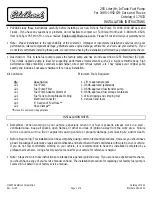
Infant And Child Restraints
Safety experts recommend that children ride rear-facing in the vehicle until they are
two years old or until they reach either the height or weight limit of their rear-facing
child restraint. Two types of child restraints can be used rear-facing: infant carriers
and convertible child seats.
The infant carrier is only used rear-facing in the vehicle. It is recommended for
children from birth until they reach the weight or height limit of the infant carrier.
Convertible child seats can be used either rear-facing or forward-facing in the
vehicle. Convertible child seats often have a higher weight limit in the rear-facing
direction than infant carriers do, so they can be used rear-facing by children who have
outgrown their infant carrier but are still less than at least two years old. Children
should remain rear-facing until they reach the highest weight or height allowed by
their convertible child seat.
WARNING!
• Never place a rear-facing child restraint in front of an air bag. A deploying
passenger front air bag can cause death or serious injury to a child 12 years or
younger, including a child in a rear-facing child restraint.
• Only use a rear-facing child restraint in a vehicle with a rear seat.
WARNING!
Do not install a rear-facing car seat using a rear support leg in this vehicle. The
floor of this vehicle is not designed to manage the crash forces of this type of car
seat. In a crash, the support leg may not function as it was designed by the car seat
manufacturer, and your child may be more severely injured as a result.
G E T T I N G S T A R T E D
41
















































